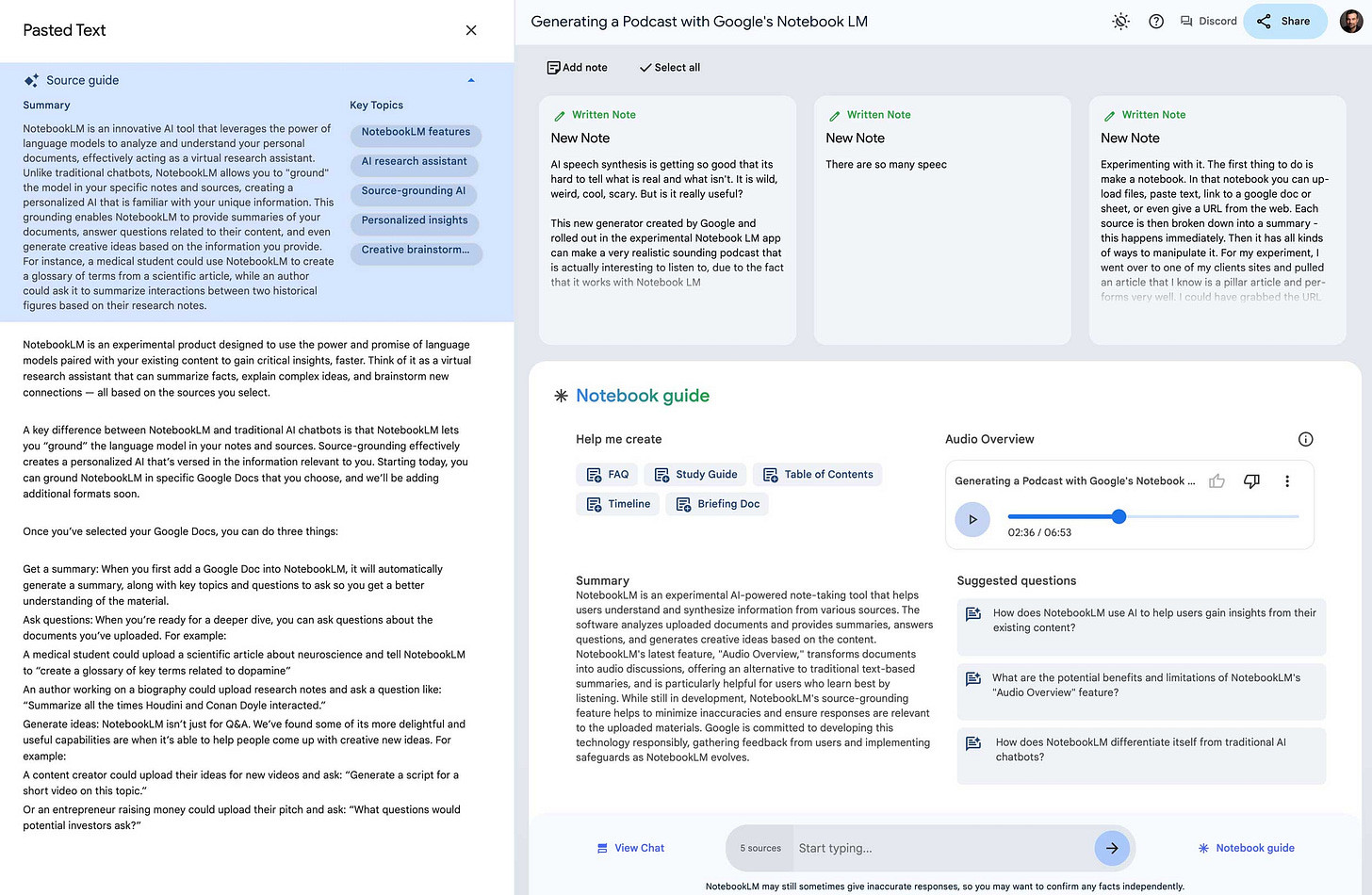Previously on Open Road Ventures: In our last episode of Venturing Insights, I introduced a small pivot for Open Road Ventures. If you missed it, you can catch up here!
Hope you had a great week! As a technology and innovation enthusiast, I am constantly experimenting. I believe we are living in a time when, more than ever, every innovator—and anyone wanting to stay ahead of the curve—should at least be aware of the new AI tools being developed and try them out.
Over the past few months, I've tested many incredible tools, but this one truly blew my mind: Notebook LM.
I fed academic reports and business articles into this Google’s new experimental tool, which then transformed the research into a lively conversation between two AI-generated hosts. The hosts bantered back and forth, made connections between topics, and even threw in a few casual comments. It’s a surreal experience listening to an AI-generated podcast where the hosts use varying tones of voice and volume (mostly accurate) to emphasize key points or make ironic remarks, like “Talking about divorce before you're even engaged” while discussing exit strategies.
While you’re enjoying this content in an unusual format, let’s reflect on what this means for content creation.
NotebookLM’s Audio Overview feature is a big leap forward. Building on the app’s original purpose—helping you interact with notes, transcripts, and other research documents—the AI hosts can now summarize your material and craft an engaging narrative. The goal is to transform static information into a dynamic and interactive format, making learning more immersive and accessible.
However, it’s not all smooth sailing. According to early reviews, including one from The Verge, the AI-generated podcasts aren’t always accurate and sometimes veer into quirky territory, using phrases that sound slightly off or out of place in serious discussions. For example, one AI host described platinum as “bling bling metal”—not exactly what you’d expect in a professional conversation.
There’s also a concern about how well these AI hosts can handle more complex and sensitive topics. Would the lighthearted tone they use to discuss the invention of the lightbulb work when talking about cancer research or geopolitical conflicts? It’s hard to say. Google itself mentions that the feature is “not a comprehensive or objective view of a topic, but simply a reflection” of your notes. This means it’s great for synthesizing information in an engaging way, but not ideal for deep dives or nuanced analysis.
That said, this experiment got me thinking: could tools like NotebookLM eventually become an integral part of how we engage with complex topics, turning dry reports into engaging audio narratives? It’s certainly possible, especially as AI models continue to improve and refine their capabilities.
Now, back to today’s topic
How startups and corporates can effectively collaborate. It’s no secret that many corporates are turning to startups to boost their innovation and remain competitive. On the other hand, startups see corporates as gateways to global markets, resources, and capital—everything they need to scale rapidly.
So what are the keys to a win-win partnership?
Access to resources and infrastructure
Startups value access to corporates’ established resources like facilities, equipment, and software. This support helps startups speed up their R&D and bring innovative solutions to market more quickly.Strategic investment over capital
While funding is important, startups prefer partners who align with their long-term vision. Corporates that invest strategically by providing mentorship or becoming customers can make a significant impact on product development and market validation.Business development support
Startups often struggle to navigate complex corporate structures. Assigning a dedicated business development contact helps streamline communication and opens doors within the organization, ensuring startups can leverage the right resources at the right time.Market access and customer insights
Corporates can offer startups access to their customer base and invaluable market insights. This exposure not only enhances product-market fit but also provides credibility, making it easier for startups to scale.Technical expertise and mentorship
Startups benefit immensely from corporate partners’ technical knowledge and industry best practices. This expertise can elevate a startup’s product development, ensuring they build solutions that meet industry standards.Mutual respect and long-term commitment
Startups value corporate partners who respect their vision and show commitment to a long-term relationship. This means being patient during product development, adapting strategies based on feedback, and fostering a collaborative environment.Pilot projects with clear revenue pathways
While pilots and proofs of concept (POCs) can validate technology, startups need a clear path to revenue to justify the investment of time and resources. The most successful pilots engage the corporate’s salesforce early on, converting pilot projects into paying customers.
These are just a few of the themes the hosts touched on in the podcast, and they’re only the tip of the iceberg. I’d love to hear your thoughts: what’s been your experience with similar collaborations? What challenges have you faced, or what successes have you seen? Share your stories in the comments!
Now, just a few closing words about the AI-generated podcast.
Will Joe Rogan be replaced by AI? I don't think so, but...
Imagine hyper-personalized podcasts that cater to your exact interests, interactive shows where listeners shape the direction of the conversation, or multilingual episodes that seamlessly break language barriers. AI could even bring historical figures or deceased personalities into virtual discussions, exploring their ideas across time. It can even act as a real-time assistant, providing relevant facts to help human hosts deliver deeper and more insightful content.
Imagine also an AI host that’s always up-to-date with the latest news, capable of asking hyper-relevant questions on any topic, and never forgetting a single detail from previous episodes. It all sounds impressive, but can AI replicate the chemistry, unpredictable humor, and genuine curiosity that Joe Rogan brings to his interviews? Not quite. For now, AI might complement the conversation, but it still lacks that human touch that keeps us all hooked.
The experiment with Google’s Audio Overview suggests we’re only at the beginning of an era where AI could transform how we interact with information, making it more engaging, personalized, and easy to digest.
I’ll leave you with this reflection and an open invitation to join the discussion. Hop into the comments section and share your experiences of collaboration between startups and corporates. There’s still so much to explore and learn together.
Until next time!
Davide
One last thing…
If you enjoy the content and feel like supporting my work, consider upgrading to a paid subscription! It’s like buying me a coffee + croissant each month (I live in Italy :)). Plus, you'll get access to even more exclusive insights. Thanks for being part of this journey!
As usual… a soundtrack for you:









Share this post